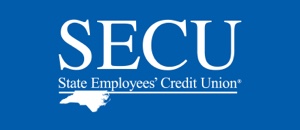State Employees’ Credit Union Review 2024
Commitment to Our Readers
GOBankingRates' editorial team is committed to bringing you unbiased reviews and information. We use data-driven methodologies to evaluate financial products and services - our reviews and ratings are not influenced by advertisers. You can read more about our editorial guidelines and our products and services review methodology.

20 Years
Helping You Live Richer

Reviewed
by Experts

Trusted by
Millions of Readers
ON THIS PAGE

GOBankingRates Score
Quick Take: State Employees' Credit Union of North Carolina (SECU) has a comprehensive selection of banking, loan, credit card, insurance and investing products and services, all under one roof. However, you'll need to qualify for membership as a state or public-service employee (or be related to one). This State Employees' Credit Union review will detail everything you need to know.


Quick take: For eligible employees in North Carolina, State Employees’ Credit Union offers a large selection of financial products to manage your money.
Pros
- One-stop shopping for financial services
- Several tax-advantaged accounts to choose from
- Low account fees
- Customer service available at 272 branches or by calling the 24/7 hotline
Cons
- $25 membership fee ($5 for children age 12 and under)
- No way to avoid monthly maintenance fees
State Employees’ Credit Union Overview
State Employees’ Credit Union (SECU) was founded in 1937 in North Carolina with $437 in assets, operating part-time to serve its handful of members. Today, with over 270 branch locations and more than 1,100 ATMs, the credit union serves more than 2.8 million members statewide.
Like all credit unions, SECU is nonprofit and member-owned. To be eligible for membership, you must be an employee of either the State of North Carolina, a public board of education or an association that serves state employees. Immediate family members of these individuals are also eligible.
State Employees’ Credit Union Products
The credit union provides a variety of account types, retirement planning, investment services, insurance and financial management for high-net-worth clients.
Checking Accounts
SECU comes in strong among checking account options.
The options start with SECU’s standard checking account. There’s no minimum deposit and just a $1 monthly maintenance fee. In addition, you’ll get up to 50 free checks per statement period, then 20 cents each. Dividends currently pay out 0.05%.
SECU also offers a Z-Checking account in its Zard program for teens ages 13 to 19, earning the same 0.05% APY. When the account owner turns 20, the account will convert into a regular SECU checking account. Also, teens can tap into $1,000 in group term life insurance without any cost through this account.
If a standard checking account doesn’t quite fit your needs, consider a CashPoints Global account and debit card. The check-free account allows you to pay bills online and saves you from overdraft fees, making it a low-cost option. There’s a $1 monthly maintenance fee but no minimum balance requirement.
Savings Accounts
Members automatically receive a standard “share savings” account when they join SECU. A minimum amount of $25 is required to open it but your balance will earn 0.25% APY. However, SECU offers plenty of other savings account options.
The Holiday Cash Club account is designed to help you save for holiday spending. You don’t need to make a minimum deposit to open the account and you’ll earn 0.25% APY. If you struggle to save for the festive season, tucking funds into a separate account could help.
The Summer Cash account is another specialty account offered by SECU. It is designed for teachers and other employees and other employees who only get paid during part of the calendar year. Throughout the year, you’ll tuck away funds to use during the summer. This account currently offers a 5.60% APY.
There are also Zard and FAT CAT Share accounts for kids, which each earn 0.25% APY. Plus, SECU offers tax-advantaged options for education, retirement and health savings.
Money Market Accounts
If you have $250 to open a savings account and can maintain that amount as a minimum balance to save yourself a $2 monthly fee , consider opening an SECU Money Market Share account. You’ll earn higher interest with a money market account than the share savings account (2.00% APY vs. 0.25%), and there are no maturity restrictions like you have with a certificate of deposit.
SECU’s Money Market Share account does not allow for bill pay, ACH transfers or check writing, limiting withdrawal options.
Share Term Certificates
A share term certificate is the credit union equivalent of a certificate of deposit and SECU offers just one. Terms range from six to 60 months with rates of 3.20% to 4.65% APY.
You can start with as little as $250. Members with more money to invest can “ladder” certificates, which will give you more regular access to funds without giving up on the higher interest rates offered through a CD.
Loans
State Employees’ Credit Union offers mortgages, auto loans, personal loans and credit cards. Below is a closer look at each.
- Mortgages: SECU offers fixed-rate mortgages, adjustable-rate mortgages, and home equity loans. You can tap into a 15 year or 30 year term for the fixed-rate mortgage options. Rates are competitive. You can get pre-qualified online, over the phone, or at a local branch.
- Auto loans: Members who qualify can tap into auto loans for new or used vehicles. New vehicle loans are available for terms of up to 96 months. Used auto loans are available for up to 72 months.
- Personal loans: Several personal loans are available, including unsecured and secured options. Also, a salary advance loan of up to $500 is available for members with an eligible paycheck.
- Credit card: SECU offers a Visa credit card with zero liability protection, the ability to quickly lock your card, and relatively low interest rates for a credit card.
Best Features
GOBankingRates uses specific criteria to score and identify the best financial institutions in the country. Among SECU’s strongest features were four particular categories:
Breadth of Products
Not everyone has the time to shop around for the best bank options and maintain multiple accounts across several institutions. So it’s convenient when credit unions are large enough to offer a variety of services including accounts, financial advisory and planning, as well as insurance and loans. Receiving special relationship rates for your loyalty is an added bonus. SECU ranks well in providing nearly everything you need in your financial journey.
Ease of Use
SECU makes it simple to open an account online or at the 270+ branches throughout North Carolina. The credit union requires individuals to qualify for membership first. Fortunately, the process of qualifying for an account — and opening one — can be handled at the same time. For members comfortable with digital banking, the website and mobile app are robust enough to handle everyday financial needs such as balance tracking, bill payments and mobile check deposits.
Customer Service
Besides the local service available at SECU branches, the credit union is available 24/7 by phone. The Ask SECU knowledge base can answer frequently asked questions. If you need help the personal touch offered by this credit union can make all the difference.
Fees
Credit unions typically have lower fees than traditional banks. SECU is no exception. Overdraft fees, which are typically the most expensive fee a bank charges, are free at SECU or just $12 if the account’s overdrawn grace period is exhausted.
Editor’s Favorite
One of SECU’s greatest strengths is in creating products that address the specific needs of its members. Salary Advance Loans and Summer Cash savings accounts are especially useful for educators.
Banking Experience
Branch locations and ATMs located throughout North Carolina mean SECU is always within reach. However, you can avoid in-person banking for most transactions by using SECU’s online and mobile banking services. Either option makes for a positive banking experience.
Customer Service
Local branches accept calls during normal business hours, which are 8:30 a.m. to 5:30 p.m. Or you can call Member Services 24/7 for assistance. Self-service for account activity and information is available via Member Access, Mobile Access and the ASK SECU 800-number.
Branch Availability
SECU operates 275 branches located throughout North Carolina. Visit the SECU Locate Us page to search for your nearest branch or browse a full list of locations.
Digital Experience
SECU’s online and mobile platforms have all the usual features, such as funds transfers, bill pay, peer-to-peer payments, account alerts and account activity. Online banking also integrates with Quicken, allowing you to download information from most SECU deposit, credit card and loan accounts. You can even take an advance on the available balance of some loan types in real time.
The mobile app is available for iOS and Android. App Store ratings give it 4.9 out of five stars and it has 4.8 out of five stars on Google Play.
Convenience
With over 270 branches and ATMs with no surcharges or access fees located in every county in North Carolina, SECU gets high marks for convenience.
How To Open an Account
Visit a branch or call Member Services at 888-732-8562 to request membership. Once your eligibility has been verified, you’ll establish your membership by opening a share savings account with a $25 initial deposit. Then you can enroll in Member Access, which gives you access to online and mobile banking, to open additional accounts.
Fees
Although SECU has monthly fees you can’t avoid, you’ll pay just $1 and can have it donated to the SECU Foundation if you prefer. SECU does charge a non-sufficient funds fee, but your share savings account — the one that establishes your membership — automatically provides overdraft protection, and you can designate other accounts and lines of credit for this purpose as well.
- Monthly maintenance fee: $1, can be designated as SECU Foundation donation
- Overdrafts/non-sufficient funds: $12, after Fee Free days are exhausted
- Overdraft transfers: $0
- ATM fee: $0.75 per completed transaction or inquiry at a VISA/Plus ATM; $0.35 cents per incomplete transaction or inquiry
- Wire transfers: $10 to send domestically, $25 to send internationally
State Employees’ Credit Union vs. Competitors
Before you make a final decision about which financial institution to bank with, consider several options. Here are some details about SECU’s competitors to help you determine how SECU stacks up.
| Bank | Best For |
|---|---|
| State Employees’ Credit Union | Innovative savings products that help members stay on top of their finances |
| Navy Federal Credit Union | Membership benefits geared especially to members of the military |
| Coastal Federal Credit Union | Wide membership eligibility within North Carolina |
| Wells Fargo | Sheer volume of products and services available |
State Employees’ Credit Union vs. Navy Federal Credit Union
Navy Federal Credit Union members are current or past members of the military or their family members, so the credit union provides them with special services, such as an overseas customer service number they can call collect while deployed. SECU also caters specifically to its membership, which includes North Carolina educators, with products such as the Summer Cash account that makes managing irregular paychecks easier.
State Employees’ Credit Union vs. Coastal Federal Credit Union
Coastal Federal Credit Union is easier to join because eligible members include individuals who live, work, worship, attend school or do business in a number of North Carolina counties, whereas SECU membership is more specific and restricted. But if you’re eligible, SECU gives you more account options for your children, especially teenagers.
State Employees’ Credit Union vs. Wells Fargo
As one of the nation’s largest banks, Wells Fargo offers a dizzying array of financial products and services, and lots of options within each category, such as checking. Unlike banks, credit unions are non-profit, member-owned financial institutions. As such, SECU maintains a more local focus and a strong commitment to its members and its community.
Final Take on State Employees’ Credit Union
With a comprehensive array of banking options — plus credit cards, loans, insurance and investing — SECU can help members manage their money from their teen years through their golden years. If you’re eligible for membership or think you might be, it’s worth your while to call or stop by your local branch to talk to a credit union representative about joining.
State Employees' Credit Union FAQ
Some other points you may be interested in include:- Who can become a member of State Employees' Credit Union?
- To be eligible for membership, you must be an employee of the state of North Carolina, a public board of education or an association that serves state employees. Immediate family members of these individuals are also eligible.
- Are SECU employees state employees?
- SECU is licensed -- or chartered -- by the state of North Carolina, but it is not a state agency. Like other credit unions, it's owned by its members.
- Is SECU only in North Carolina?
- Although other states have credit unions named State Employees' Credit Union, the North Carolina credit unit of that name is specific to North Carolina. Its 270+ branches and 1,100+ ATMs are all located within the state.
- What's the difference between SECU and LGFCU?
- Local Government Federal Credit Union membership is open to employees and volunteers of North Carolina state departments and agencies or local jurisdictions, whereas SECU also includes individuals who work for associations that serve state employees.
- Does SECU offer free money for signing up for an account?
- SECU isn't running any free-money promotions right now, but it does offer some freebies. All branches have FAT CAT coin sorters you can use free of charge, and SECU also provides free notary services and free shred days when you can securely dispose of paper documents.
Sarah Sharkey and Cynthia Bowman contributed to the reporting for this article.
Rates are subject to change. Information on accounts is accurate as of Nov. 6, 2024
Editorial Note: This content is not provided by SECU. Any opinions, analyses, reviews or recommendations expressed in this article are those of the author alone and have not been reviewed, approved or otherwise endorsed by SECU.
 Written by
Written by  Edited by
Edited by 









